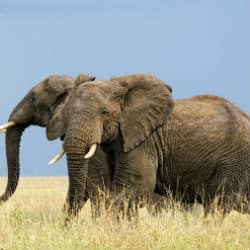WWF Helps Break Up Major Ivory Trafficking Network

WWF has helped the authorities in the Democratic Republic of Congo (DRC) to dismantle a major ivory trafficking syndicate striking a significant blow to the illegal ivory trade. Authorities in the DRC seized roughly 66 pounds of ivory tusks and ornaments at the start of the month and arrested several traffickers who remain in custody. Every year thousands of elephants are slaughtered and the arrests represent a major step in the fight against wildlife crime.
“WWF congratulates the DRC government for successfully breaking up this ivory trafficking network. This crackdown shows that ivory traffickers can no longer count on impunity for their crimes in this country, and demonstrates that with determination, we can be successful in the fight against wildlife crime, even in DRC.” said Bruno Perodeau, WWF-DRC conservation director.
Elephant poaching on an industrial scale
The rainforest in the Congo serves as home to the African forest elephant and is the second largest rainforest in the world. Two thirds of this rainforest is located in the DRC where elephant poaching takes place on a scale that can only be described as being industrial. If we do not put a stop to poaching we could lose the African forest elephant altogether from the DRC in the foreseeable future.
The threat of sanctions
Convention on International Trade in Endangered Species (CITES) is a an international treaty designed to regulate the trade wild flora and fauna. In 2014 CITES put in a request to the DRC to formulate a plan of action to tackle wildlife crime and the ivory trade. Last March the body recommended that commercial sanctions be imposed on the DRC because the country failed to finalise an action plan within the agreed time limit. Faced with the threat of sanctions the country has begun to take strong action on wildlife crime and is using an action plan to crack down on ivory trafficking networks.
WWF needs your help
It is estimated that 30,000 elephants are killed each year so poachers can sell their ivory. In order to end this abomination, WWF focuses on zero poaching efforts which seeks to reduce demand for ivory and break up trafficking networks. The organisation works along with governments, communities and supporters to put an end to wildlife crime.



